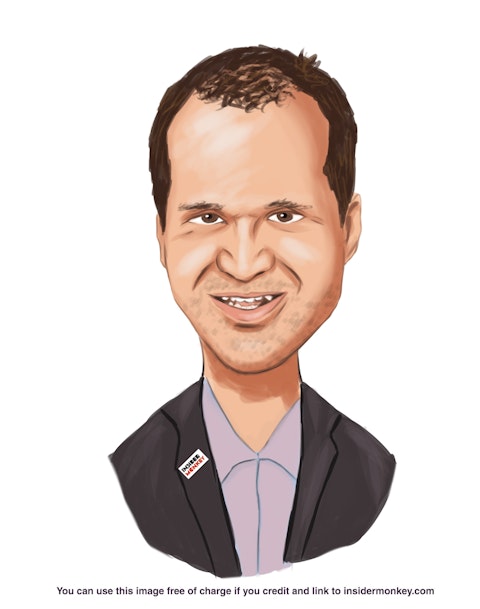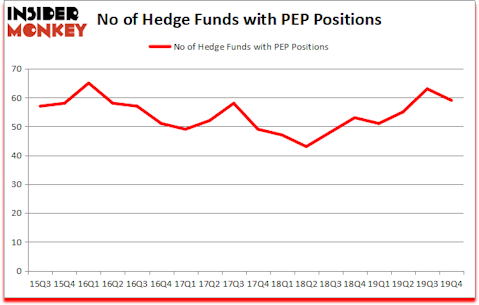Coronavirus is probably the #1 concern in investors’ minds right now. It should be. On February 27th we publish an article with the title “Recession is Imminent: We Need A Travel Ban NOW”. We predicted that a US recession is imminent and US stocks will go down by at least 20% in the next 3-6 months. We also told you to short the market ETFs and buy long-term bonds. Investors who agreed with us and replicated these trades are up double digits whereas the market is down double digits. Our article also called for a total international travel ban to prevent the spread of the coronavirus especially from Europe. We were one step ahead of the markets and the president.
Is PepsiCo, Inc. (NASDAQ:PEP) the right investment to pursue these days? Hedge funds are taking a pessimistic view. The number of bullish hedge fund positions went down by 4 lately. Our calculations also showed that PEP isn’t among the 30 most popular stocks among hedge funds (click for Q4 rankings and see the video below for Q3 rankings).

Video: Click the image to watch our video about the top 5 most popular hedge fund stocks.
To most investors, hedge funds are assumed to be worthless, outdated financial vehicles of yesteryear. While there are over 8000 funds in operation at the moment, We choose to focus on the crème de la crème of this club, around 850 funds. These money managers administer bulk of the hedge fund industry’s total capital, and by observing their matchless stock picks, Insider Monkey has formulated several investment strategies that have historically outpaced Mr. Market. Insider Monkey’s flagship short hedge fund strategy defeated the S&P 500 short ETFs by around 20 percentage points per annum since its inception in March 2017. Our portfolio of short stocks lost 35.3% since February 2017 (through March 3rd) even though the market was up more than 35% during the same period. We just shared a list of 7 short targets in our latest quarterly update .

Matthew Hulsizer of PEAK6 Capital
We leave no stone unturned when looking for the next great investment idea. For example Europe is set to become the world’s largest cannabis market, so we check out this European marijuana stock pitch. We read hedge fund investor letters and listen to stock pitches at hedge fund conferences, and and go through short-term trade recommendations like this one. We even check out the recommendations of services with hard to believe track records. In January, we recommended a long position in one of the most shorted stocks in the market, and that stock returned more than 50% despite the large losses in the market since our recommendation. With all of this in mind let’s take a glance at the recent hedge fund action regarding PepsiCo, Inc. (NASDAQ:PEP).
How have hedgies been trading PepsiCo, Inc. (NASDAQ:PEP)?
Heading into the first quarter of 2020, a total of 59 of the hedge funds tracked by Insider Monkey were long this stock, a change of -6% from the third quarter of 2019. On the other hand, there were a total of 53 hedge funds with a bullish position in PEP a year ago. So, let’s check out which hedge funds were among the top holders of the stock and which hedge funds were making big moves.

Among these funds, AQR Capital Management held the most valuable stake in PepsiCo, Inc. (NASDAQ:PEP), which was worth $887.1 million at the end of the third quarter. On the second spot was Yacktman Asset Management which amassed $607.5 million worth of shares. D E Shaw, Diamond Hill Capital, and Adage Capital Management were also very fond of the stock, becoming one of the largest hedge fund holders of the company. In terms of the portfolio weights assigned to each position Yacktman Asset Management allocated the biggest weight to PepsiCo, Inc. (NASDAQ:PEP), around 7.68% of its 13F portfolio. Antipodes Partners is also relatively very bullish on the stock, designating 2.59 percent of its 13F equity portfolio to PEP.
Judging by the fact that PepsiCo, Inc. (NASDAQ:PEP) has experienced declining sentiment from the entirety of the hedge funds we track, logic holds that there was a specific group of hedge funds who were dropping their full holdings heading into Q4. Interestingly, Steve Cohen’s Point72 Asset Management said goodbye to the biggest position of the “upper crust” of funds monitored by Insider Monkey, valued at an estimated $142.2 million in stock, and Ken Griffin’s Citadel Investment Group was right behind this move, as the fund cut about $32.2 million worth. These transactions are intriguing to say the least, as total hedge fund interest fell by 4 funds heading into Q4.
Let’s go over hedge fund activity in other stocks similar to PepsiCo, Inc. (NASDAQ:PEP). These stocks are The Boeing Company (NYSE:BA), Citigroup Inc. (NYSE:C), China Mobile Limited (NYSE:CHL), and Oracle Corporation (NYSE:ORCL). This group of stocks’ market valuations are similar to PEP’s market valuation.
| Ticker | No of HFs with positions | Total Value of HF Positions (x1000) | Change in HF Position |
|---|---|---|---|
| BA | 82 | 2856387 | -1 |
| C | 98 | 11733711 | -3 |
| CHL | 12 | 386065 | 0 |
| ORCL | 59 | 3719807 | 3 |
| Average | 62.75 | 4673993 | -0.25 |
View table here if you experience formatting issues.
As you can see these stocks had an average of 62.75 hedge funds with bullish positions and the average amount invested in these stocks was $4674 million. That figure was $3107 million in PEP’s case. Citigroup Inc. (NYSE:C) is the most popular stock in this table. On the other hand China Mobile Limited (NYSE:CHL) is the least popular one with only 12 bullish hedge fund positions. PepsiCo, Inc. (NASDAQ:PEP) is not the least popular stock in this group but hedge fund interest is still below average. Our calculations showed that top 20 most popular stocks among hedge funds returned 41.3% in 2019 and outperformed the S&P 500 ETF (SPY) by 10.1 percentage points. These stocks lost 12.9% in 2020 through March 9th but beat the market by 1.9 percentage points. A small number of hedge funds were also right about betting on PEP as the stock returned -4.1% during the same time period and outperformed the market by an even larger margin.
Disclosure: None. This article was originally published at Insider Monkey.


